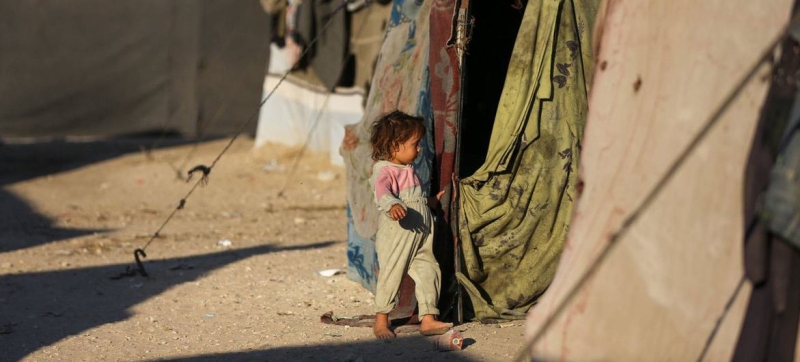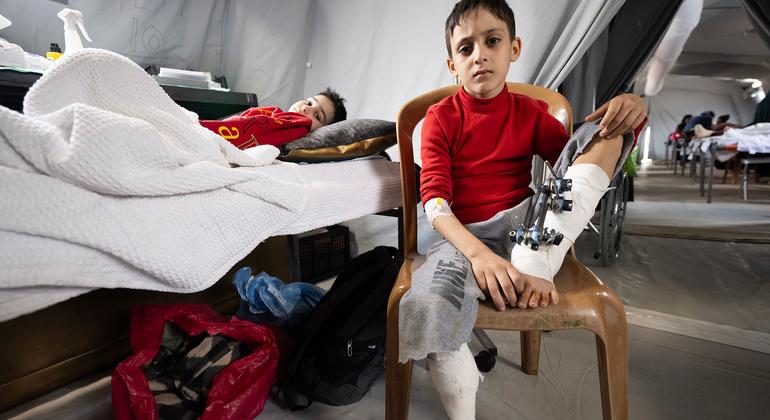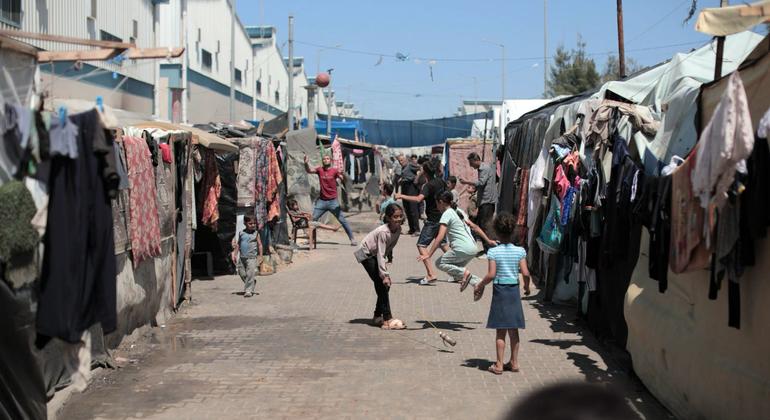
Gaza: ‘Totally unacceptable’, says Antonio Guterres Gaza: UN deaths, wheelchair shortages and economic crisis Peace and security
The UN secretary-general has reiterated the need for an immediate end to violations of international humanitarian law in Gaza, after an Israeli strike on a school used as a shelter for 12,000 people killed six UNRWA staff members.
Gaza: ‘Totally unacceptable’, says Antonio Guterres.
Medical rehabilitation needs
Meanwhile, according to a new study by the World Health Organization (WHO), as of July 23, about 22,500 wounded people in Gaza had sustained injuries that seriously affected their daily lives and required rehabilitation services.
The analysis showed that severe limb injuries were the main reason for the need for rehabilitation. According to the WHO, between 3,105 and 4,050 limb amputations were carried out among the Gazan population during the reporting period. The conflict has also resulted in a high incidence of spinal cord injuries, traumatic brain injuries and extensive burns.
“The huge surge in rehabilitation needs is occurring alongside the ongoing breakdown of the health system,” said Richard Pieperkorn, WHO Representative in the Occupied Palestinian Territory.
Services unavailable
Gaza’s only limb reconstruction and rehabilitation centre, which operated in the WHO-supported Nasser Medical Complex, ceased operations in December 2023 due to a lack of supplies and specialists, and was later damaged in a raid in February 2024. Many health workers were forced to flee for safety. As of 10 May, 39 physiotherapists had been killed, according to the WHO.

According to the report, inpatient rehabilitation and prosthetic services are no longer available, and the need for specialized equipment far exceeds the ability to provide it. For example, according to the WHO, supplies of such items as wheelchairs and crutches have run out, and supplies to Gaza are too limited.
Meanwhile, tens of thousands of residents of the enclave suffered from chronic diseases and other disabilities even before the conflict, which put them at significant risk due to the lack of necessary services and medical equipment.
A Devastated Economy
Meanwhile, the authors of a new report by the UN Conference on Trade and Development (UNCTAD) warn that Gaza’s gross domestic product (GDP) fell by 81 percent in the last quarter of 2023. By mid-2024, the enclave’s economy had shrunk to less than a sixth of its 2022 level, the report said.
Read also:
UN Security Council meeting on Gaza: situation in the strip ‘more than desperate’
By early 2024, between 80 and 96 percent of Gaza’s agricultural assets, such as irrigation systems, livestock farms, orchards, machinery and storage facilities, had been destroyed, worsening the already dire food situation. The conflict has also dealt a severe blow to the private sector, with 82 percent of businesses damaged or destroyed.
West Bank Crisis
The West Bank is experiencing a surge in violence, with Palestinian homes being destroyed, property confiscated and Israeli settlements expanding. According to UNCTAD, the military operation in Gaza and its aftermath have sent shock waves through the economy across the Occupied Palestinian Territory, including East Jerusalem. As a result, 80 percent of businesses in East Jerusalem’s Old City have partially or completely ceased operations.
Initial optimism about West Bank GDP growth in the first three quarters of 2023 was dampened by a record 19 percent contraction in the fourth quarter. In addition, GDP per capita fell by 4.5 percent, indicating a significant decline in living standards and incomes.
Mass unemployment
According to UNCTAD, labor market conditions have worsened significantly. The situation is particularly dire in Gaza: by January 2024, compared to the situation before the war, two-thirds, or approximately 201 thousand, jobs had been lost.

In the West Bank, 96 percent of businesses reported a decrease in activity, and 42.1 percent reduced their workforce. A total of 306,000 jobs were lost, pushing the unemployment rate in the West Bank from 12.9 percent before the conflict to 32 percent.
Trade activity has been severely disrupted by tightened restrictions on the movement of people and goods. The number of checkpoints in the occupied West Bank has increased from 567 in early October 2023 to 700 by February 2024, significantly hampering economic activity.
Income Deductions and Withholding
The financial stability of the Palestinian government and its ability to provide basic services to the population is at risk. Fiscal capacity has been undermined by slow GDP growth, measures imposed by Israel and a sharp reduction in international aid. In 2023, international donor support fell to a record low of $358 million, equivalent to just 2 percent of GDP, down from $2 billion, or 27 percent of GDP, in 2008.
Since October 2023, Israel’s revenue deductions and withholdings have increased sharply, totaling more than $1.4 billion between 2019 and April 2024. This amount represents 8.1 percent of Palestinian GDP in 2023. The budget deficit is hampering the government’s ability to pay employees, service debt, and maintain essential public services such as health and education. The situation has led to mounting arrears, delayed payments to private providers, and cuts in social benefits. Since November 2021, civil servants have been paid only partial salaries.
